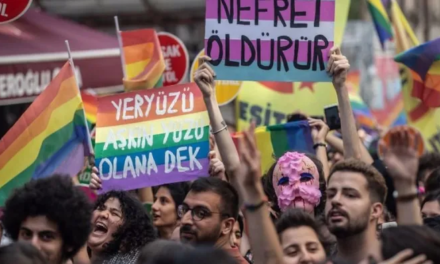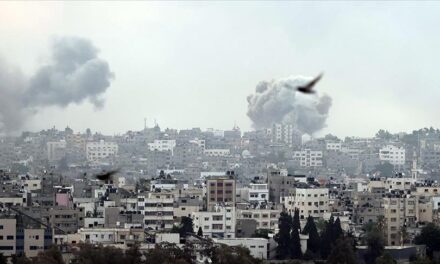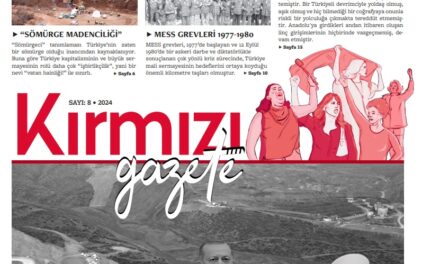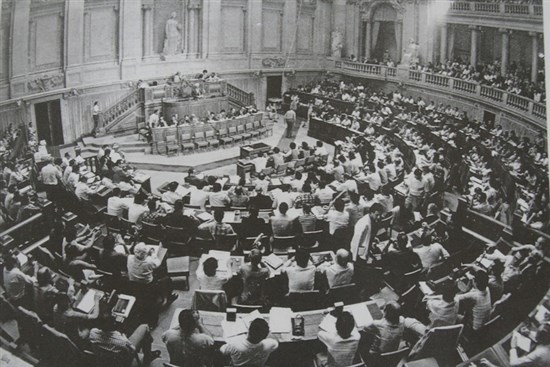Historical Background: Political Revolution without Mass; “From Above” Social Revolution and After! ..
Turkey lived two bourgeois revolutions, the first one was during the Ottoman period (1908), and the second was during the Independence War and the period after it (1919 and 1923). Although the first of these revolutions struggled against the “real semi-colonialist” position of the country, it was blocked at the initial period, except for some partial gains, defeated after World War I. However, the second bourgeois revolution, which started in 1919 with the struggle for independence against the imperialist occupation, provided a radical break from the past socio-economic, legal, and cultural structure. All these meant removing the obstacles in front of the development of capitalism and the final realization of the social domination of the bourgeoisie.
However, in the age of imperialism, when the bourgeoisie became completely reactionary and feared the masses, even more, it was very difficult for a “late” bourgeois revolution to have a democratic character. As a matter of fact, this “massless” bourgeois revolution, in which the masses of the working class, who were completely unorganized and crushed, did not acquire a democratic character. This feature of the revolution determined the character and structure of the republic that was established after independence.
The “bourgeois social revolution” process, which started in 1923 and aimed to create a capitalist society, was experienced as a “from above” revolution, as in many “late” bourgeois revolutions. This reflected the profound fear of the bourgeoisie about the Bolshevik Revolution just beyond the border, as well as the consequences of its alliance with the ruling powers of the old period.
A reactionary alliance, lack of democracy, and a Bonapartist beginning.
The new regime was based on the social-class alliance between the (Muslim) commercial bourgeoisie and the big landowners. (The Christian – Greek and Armenian – industrial and commercial bourgeoisie and landowners were purged.) But political control was firmly in the hands of the military-civilian bureaucracy that led the war of independence. For this reason, the regime acquired a “Bonapartist” character from the very beginning. This was Bonapartism of a “founding” character. The formation of the republican regime by the “power bloc” consisting of the commercial bourgeoisie, big landowners, and the Bonapartist bureaucracy, which was trying to enrich with various economic activities, had a definite influence on the later process.
Historically “democratic revolutionary” practices such as the abolition of the sultanate (monarchy) and the caliphate, the prevalence of the principle of secularism over the state administration, and giving women the right to vote and be elected under a one-party regime in 1934, were not aimed at the social-political emancipation of the poor people, urban and rural workers, but the elimination of the obstacles (from old order) in front of bourgeois society.
Apart from democratization in the political sense, the single-party regime turned towards fascist-racist (directly skullist!) -corporatist discourses and practices, especially in the 30s, with the effect of the general situation in Europe, ideologically, culturally, and politically. In the same period, directly fascist tendencies gained strength within the bureaucracy and especially in the army, with the effect of Hitler who came to power in Germany (the historical ally). Sympathy for Nazi Germany became widespread among the state staff. Preventing political democracy, suppressing the organizing efforts of the working classes, oppressing the left, forcing national minorities to migrate, trying to “Turkify” the Kurdish people through exile, assimilation, and massacres, etc. practices were inevitable results of a bourgeois revolution devoid of democratic and libertarian character. For this reason, the “revolutionism” of the new regime could not surpass a Bonapartist-despotic “enlightenment”, which also ideologically oppressed the people and especially humiliated the rural and urban poor.
Moreover, even in the years when the national liberation war was continuing, despite the big military-financial aid from the revolutionary power in Russia, the agreements made with imperialism determined the political-diplomatic position of the country on the international plane. The new regime, starting from the stage that preceded its establishment, was determined to “Westernize” in line with the late Ottoman modernization line. Despite all his independence slogans and even his practices (nationalizations) aimed at saving the country from being a semi-colony, he acted against “Bolshevism” with the goal of taking part in the capitalist-imperialist world system. This position did not allow for a bourgeois democracy that would allow the relative emancipation and independence of the working classes.
An “incomplete” bourgeois revolution in which the masses are excluded!
In Turkey, the bourgeois revolution was an armed political revolution (War of Independence) which excluded working masses and it was experienced as an “above” social revolution, which goal was the removal of barriers to constructing a capitalist society. This revolution remained an incomplete revolution in terms of bourgeois tasks such as political democracy, rural-urban relations, the liberation of the peasantry, the national question, and the solution of the land-agriculture problem. With the “social revolution from above” carried out on the basis of the socially reactionary alliance of the bourgeoisie with the big landowners and under the political leadership of the bureaucracy, the republic, devoid of democratic qualities, rapidly lost its “revolutionary dynamism” and began to decay.
This was also a process in which at least part of the bourgeoisie began to experience tensions with the bureaucracy, and even politically separated from 1946 onwards. (Establishment of the Democratic Party and it’s coming to power in 1950) The alliance of the bourgeoisie with the landowners continued in its old form until the 50s when a rapid industrialization and economic change process began. At the same time, the strengthening of Turkey’s relations with the world economy and depending on the position and the new agricultural policy in the international economic division, the major landowners, became big agriculture capitalist and some even became an industrialist. With the support of the USA (Marshall Aid), as a result of modernization and mechanization that started in agriculture, agricultural areas dominated by pre-capitalist relations were transformed into large capitalist farms, while thousands of poor peasants working in the landlord-owned villages were exiled from their lands. This is one of the important reasons for immigration to cities and proletarianization that started in the 1950s.
Industry and working-class …
Turkey is a “low-medium” developed “dependent” capitalist country which is dominated by finance capital. (G-20 member and 19th largest economy in 2019) The industrialization of the country was initiated by the state in the 1930s and reached a certain level of development in the following period with the effect of state supports and foreign investments. The share of industry in national income is 22.4 percent in 2019. In addition, the share of the manufacturing sector in exports is high. However, the industrial production of the country is predominantly based on a low and medium level of technology.
Turkey has a relatively large proletariat. The vast majority of the workable population consists of workers. In 2019, 22.2 million workers, 5.5 million of which are in industry sectors, as well as mobile agricultural workers, whose number is estimated to be between 300 thousand and 1 million, are employed.
Material infrastructure and the economic and social elements of Turkey are sufficient for a proletarian revolution/dictatorship. However, the current level of organization and struggle of the working class is far behind compared to the past. The bosses and the government are trying to prevent the union organization of the class with all their power of repression. However, despite the decline that the working class has experienced for many years due to the increasing economic-political pressures, it has a serious potential considering both its past and the occasionally rising class struggles. At this point, the problem is not the existence-absence of the working class, but the problem of consciousness-organization-leadership.
Democracy problem
The Republic has been a Bonapartist regime that has been maintained under the political rule of the military-civilian high bureaucracy since its establishment, with the prohibitions of class-based organization and heavy oppression against the working class, political opposition, especially communists and Kurds. The unfinished bourgeois revolution’s “democracy” problem, after the ’30s and’ 40s, was continued during the transition to a multi-party regime in 1950.
In the period of a relatively democratic constitution adopted after the 1960 coup and later military coups, the inadequacy and easily eliminable nature of this “democracy” was clearly seen. This period has also been experienced as a semi-Bonapartist “control regime” politically limited by the National Security Council, which consists of generals and mostly soldiers. The bourgeoisie, which could not be stopped by “legal” means and political murders, sought to stop the opposition worker, student, and popular movements by military coups.
These army interventions, also as part of the imperialist system, was a tool of Turkey’s economic and financial capital in making social arrangements. Despite some “democratic intervals” where the pressure has decreased after the last successful army intervention (September 12, 1980), the problem of political democracy continues to exist increasingly today under a “neo-Bonapartist” regime built a few years ago by Islamists and supported by fascists.
In short, in front of a permanent revolution in Turkey, there is a “democracy” problem. But a proletarian revolution will solve this problem under the dictatorship of the proletariat and in the process of building “workers’ democracy”. As a matter of fact, some of the rights and freedoms of the working class (organization, universal suffrage, shorter working hours, etc.), which are generally defined in the “bourgeois democracy”, have been won at the barricades through direct class struggle in history and are therefore directly an element of a workers’ democracy.
Kurdish national question
One of the historical tasks that the bourgeois revolution has not solved is the solution of the Kurdish national question. More precisely, the bourgeoisie created and raised a problem that was not at the forefront of the Ottoman period. The bourgeoisie, which has been trying to “Turkify” everything with the aim of “building a new nation” since 1923, tried to “solve” the Kurdish problem by denying the existence of Kurds, exile, and massacres. Northern Kurdistan (Turkey Kurdistan), which always kept under heavy national oppression, sometimes managed in “colonial” status.. (special laws, courts, exile plans, and general governors) Therefore, there were many Kurdish revolts from 1925 to 1938. Thousands of Kurds were killed. Although it has been interrupted from time to time since 1984, a bloody war is going on in the region. (Over 60 thousand dead)
In short, in Turkey, there is a “Kurdish national problem” with a large-scale historical impact. Until Kurdish people’s right to self-determination reach a real solution, the Kurdish question ill is the main task of the revolution in Turkey; of course, along with all other ethnic problems. The revolutionary struggle that will be given to solve the Kurdish problem, in the four neighboring countries (Turkey, Iran, Iraq, Syria) will be one of the most important dynamics of the socialist revolution in the region.
Agriculture-land and peasantry
One of the historical tasks that the bourgeois revolution cannot fulfill is the solution to the agrarian-land problem. The reason for this was the alliance of the bourgeoisie with the big landowners. Far from being “liberated by the republic,” the peasantry was handed over directly to the big landowners; there was no land reform. The pre-capitalist relations in the fields of agriculture were not dissolved by the bourgeois regime by revolutionary methods, but by a process of economic-technological change and capitalization over time.
In this process, the proportion of farms with large capitalist production for the domestic market and the world market has increased steadily. These farms grew as well as opening up new agricultural lands and buying land owned by small and poor farmers. A large part of agricultural land in Turkey belongs to small and medium-sized enterprises. (98% of the enterprises, 79% of the lands in 2006) Increasingly, most of these farmers operate in agreements with domestic and foreign (or joint) large food and agriculture monopolies and retail chains, and they produce under the economic-technical conditions determined by them. This situation also causes the farmers who protect their lands to become “proletarians” who are subordinate to the big bosses in their own lands.
Small and medium farmers who were supported by the state for political-social reasons in the past, fell into serious difficulties with the effect of the neoliberalization process that started in agriculture in the 1980s, some left their lands and became workers in cities, turned to other jobs; Most of those staying in rural areas turned to non-agricultural activities (small trade, service, transportation, tourism). A part of this group living in Kurdistan turned into seasonal agricultural workers (estimated between 300 thousand and 1 million). In the free market economy period that started after the 1980 military coup, the support given to agricultural producers (base price, fertilizer, diesel oil, etc.) decreased significantly. Although the support given to agriculture for political reasons increased in some periods, the situation of small-medium farmers gradually worsened. In order to make a living, this group chooses to leave their lands and migrate to cities or to do other jobs in their places. Land fragmented by inheritance has become a very important problem. As a solution to this, the government proposes to the farmers to incorporate or sell their lands to agricultural companies in order to prevent the fragmentation of the lands and pass laws for this purpose.
% 23.2 of Turkey’s population lives in rural areas (2011). About 50 percent of the rural population is not engaged in agriculture. The demand for a significant portion of those is to work in jobs with paid-social security in agricultural or other industrial enterprises to be established by the state or private sector. In short, the agricultural problem is now determined directly by the conditions of a neoliberal-capitalist economy, unlike the foundation years of the republic.
In Turkey, the problem of land-agriculture tasks, in the context of permanent revolution, should be handled differently from 1917 Russia. The priority is the real support of small farmers by the state (cheap credit, seed, fertilizer, technology, scientific research, etc.) and socialization of large capitalist agricultural enterprises. The fragmentation of these enterprises for the purpose of land distribution will create many political and social problems for a revolutionary power, apart from a decline in agriculture. The purpose of the revolution should not be to raise a rural petty bourgeoisie again.
It will most likely be a preferred situation for millions of farmers and agricultural workers to become wage, insured, and unionized proletarians who supervise and manage these enterprises in public agricultural enterprises. It is also very important for the economic-technological development of agriculture that large agricultural enterprises are not divided. It would be a situation in which millions of farmers and agricultural workers would prefer to become wage, insured, and unionized proletarians who control and manage these enterprises in public agricultural enterprises. It is also very important for the economic-technological development of agriculture that large agricultural enterprises are not divided.
At a point we must emphasize: today in Turkey, the absence of a “land problem in the bourgeois-democratic context” (just like a monarchy absence!) such as that faced by the Russian revolution, does not undermine the idea of permanent revolution
The programs that will be written without knowing the real situation of the peasantry and agricultural, will not exceed beyond a few simple and memorized formulas as “the distribution of land to landless”. These issues, can not be addressed without knowing the structure of Turkey agriculture, the status of the distribution of land, and property relations in agriculture.
Old and new all economic, political, social, and cultural problems that can not solve by capitalism, can only be solved in accordance with the perspective of permanent revolution. Even if a revolution begins with the demands of democracy at first hand, it will face the necessity of building a dictatorship of the proletariat in a very short time in order to realize these tasks.
Briefly permanent revolution in Turkey …
The question of revolution, or rather the character of the revolution, in the backward capitalist countries, colonies, and semi-colonies is one of the most important issues of discussion among socialists. This debate is also ongoing in Turkey’s left for long years and constitutes one of the most important points of differentiation. The Stalinists’ understanding of “gradual revolution” originates from the petty-bourgeois point of view to “unfinished bourgeois revolutions” and capitalist development problems in the imperialist era.
Various troops of Stalinism (Maoism, Castrism, etc.), and the “under developmental” and “third world” views so-called “neo-Marxism” defend the validity of the “gradual” petty-bourgeois understanding with the fact that these countries are a kind of “colonial” or “semi-colonial”. This is also the case for Turkey. For these, the character of a possible revolution in Turkey will determine by its “semi-colonial character”.
A similar tendency, with different consequences, sometimes emerges among the Trotskyist ranks. These currents defend the validity of the permanent revolution in Turkey and in other less-developed countries, based on “neo-colonial” or “semi-colonial” character. The idea that Turkey is a kind of “colonial”, brings these currents to a “national liberation” program. The main reason for these currents is Turkey’s economic, technological, diplomatic, and military dependence on the world economy and imperialist system that it is sovereign.
According to this, every non-imperialist country is a kind of “colonial” if not “socialist” either! In other words, in a world dominated by capitalism, the inevitable dependence of each capitalist country on the world economy and the imperialist system at different degrees and in different positions within the hierarchy of the system directly points to its “colonization”! This brings a “national” liberation or independence problem before the revolutions of all non-imperialist countries. In other words, in a world dominated by capitalism, the inevitable dependence of each capitalist country on the world economy and imperialist system in different degrees and different positions points directly to its “colonization”! This brings the question of “national” liberation or independence to the revolutions of countries other than the imperialist ones. These views are unaware of the necessary dependence of different countries on the world economy and politics within the imperialist-capitalist system, regardless of which side they are on. They cannot grasp the “law of unequal and combined development” defined by Marxism and Trotsky.
In our opinion, with the exception of some real colonies and semi-colonies, the country’s backwardness and dependence do not pose a problem of “liberation” or independence ” against the revolution in that country. This problem arises only as a result of the direct military intervention and occupation of imperialist (or not) external forces, which also receive the support of internal reactionary forces, in order to prevent a revolution that will abolish capitalism. Such a situation will be experienced in the form of a civil war-based struggle in which the revolution defends itself against both imperialist foreign intervention and internal reactionary and bourgeoise forces, without turning into a “national liberation war”, as in the Russian Revolution.
In case of the realization of a proletarian revolution in Turkey, probably there will be a similar situation to that of Russia. But that aside, lack of “national independence” war duty, does it eliminate the anti-imperialist tasks of the proletarian revolution? Of course no. Turkey will cut off ties with imperialism and go beyond the rules of the system. It will also have to break with imperialism’s economic, financial, military, and diplomatic institutions and tools of control, and face many explicit or implicit external interventions and pressures in this way. In other words, the articles regarding NATO, IMF, World Bank, etc. in our program will not lose their validity. Moreover, this struggle will be exacerbated by the expropriation of the means of production belonging to foreigners or the refusal to pay foreign debts. Turkey also will be faced with an attack of imperialist economic blockade and punishment. However, in “low-medium developed dependent capitalist country” like Turkey, struggle against imperialism, will walk with the liquidation of capitalism and of course privately owned domestic and foreign companies. This means that the independence of the country from imperialism is not a “national” but mainly a socioeconomic-class problem.
In short, today Turkey is not a “semi-colonial” as the Ottoman Empire (absence of pre-capitalist forms of land ownership, feudal, etc.). This situation does not eliminate the necessity of permanent revolution” in Turkey … Permanent revolution in Turkey, as we tried to emphasize above, will realize on the base of concrete historical, economic, social, political conditions.









